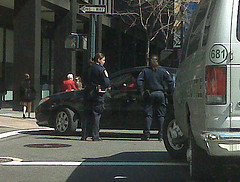 While people throughout the United States are entitled to rights involving privacy, there are a number of situations that can quickly become confusing. For many, one of the most difficult scenarios comes down to traffic stops and vehicle searches.
While people throughout the United States are entitled to rights involving privacy, there are a number of situations that can quickly become confusing. For many, one of the most difficult scenarios comes down to traffic stops and vehicle searches.
There are times when a law enforcement officer does have a right to search a vehicle and even detain the passenger and drivers, but many drivers do not realize that they have quite a few rights that allow them to steer clear of illegal searches of their body and their vehicle.
For those that are unsure of their own rights and responsibilities in these situations, here is a closer look at the laws involving traffic stops, vehicle searches, and detaining drivers.
A Driver’s Responsibilities During a Traffic Stop
Before moving into the rights created by the Fourth Amendment of the U.S. Constitution, it is just as important for the driver to know their responsibilities when these encounters do take place.
- First, many common mishaps can be avoided when all parties remain as polite and calm as possible, even under duress.
- It is also the responsibility of the driver to remember as much as possible about the event if it does happen to pass on to become a legal battle.
- Finally, the driver must not lie or give false documents at any point during stops or questioning.
Fourth Amendment Rights: The Basics
The Fourth Amendment provides a wide range of rights including many of those that are applied to those operating a vehicle.
- The most basic right is that the law enforcement officer needs to have a probable cause to pull over a driver and they must also have probable cause to search a vehicle.
- This means that a driver cannot be pulled over simply because the cop was in a bad neighborhood, however, a cop can pull over the vehicle for a broken taillight or speeding.
At this point they can run the driver’s license and plate and personal information.
Common Causes for a Search
If the officer simply requests to search a vehicle or investigate the driver / passengers, each individual has every right to politely refuse. Though the situation may seem tense, giving permission is the easiest way for an officer to have a free pass to conduct a full search. If anything is found at this point, all illegal items or signs of crime can used against the driver and potentially the passengers.
- Outside of direct consent, there are generally four instances in which an officer is legally allowed to search a vehicle.
- The “Plain View” law is one of the most common instances, and this means that the officer could see illegal substances without searching the vehicle due to it sitting out in the open.
Searching and Arrests
If the driver is in fact being arrested, the officer has a “search incident to arrest” which gives them full rights to a vehicle search. If there seems to be an overwhelming amount of evidence to raise doubt that a crime took place, the car can be searched. Common signs include:
- Visible wounds
- Blood
- Signs of a struggle
- Weapons
- Agitation or aggressiveness
Finally, an officer may immediately make any search if they believe the suspect is about to destroy vital evidence. If the officer is found to be wrong in any of these scenarios in a court of law, they are immediately in violation of the Fourth Amendment.
Knowing Your Rights
These situations can become all too tense in the blink of an eye, but knowledge can be the most powerful tool when it comes to illegal searches and traffic stops. Drivers that understand their individual rights and responsibilities will typically have the best chance at avoiding arrests, lawsuits, and ongoing legal battles.
[Image:http://www.flickr.com/photos/mmordfin/3449657555/]
Scott Desind
Latest posts by Scott Desind (see all)
- How to Request the County Seat and Fight Your California Traffic Ticket - May 21, 2023
- Don’t Even Touch That Cell Phone - July 13, 2022
- Innocent Until Proven Guilty - March 2, 2020

